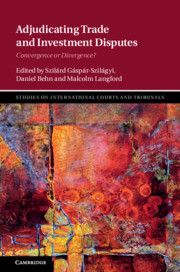Book contents
- Adjudicating Trade and Investment Disputes
- Studies on International Courts and Tribunals
- Adjudicating Trade and Investment Disputes
- Copyright page
- Contents
- Figures
- Tables
- Editors and Contributors
- Preface and Acknowledgements
- 1 Assessing Convergence in International Economic Disputes – A Framework
- Part I Dispute System Design
- Part II Use of Precedent across Regimes
- Part III Interpretive Powers and Adjudicative Behaviour
- 7 Inherent Powers of the WTO Appellate Body and ICSID Tribunals – A Tale of Cautious Convergence
- 8 The Use of Object and Purpose by Trade and Investment Adjudicators: Convergence without Interaction
- 9 Assessing Convergence between International Investment Law and International Trade Law through Interpretative Commissions/Committees: A Case of Ambivalence?
- 10 Regime Responsiveness in International Economic Disputes
- 11 Epilogue: ‘Convergence’ Is a Many-Splendored Thing
- Index
8 - The Use of Object and Purpose by Trade and Investment Adjudicators: Convergence without Interaction
from Part III - Interpretive Powers and Adjudicative Behaviour
Published online by Cambridge University Press: 25 June 2020
- Adjudicating Trade and Investment Disputes
- Studies on International Courts and Tribunals
- Adjudicating Trade and Investment Disputes
- Copyright page
- Contents
- Figures
- Tables
- Editors and Contributors
- Preface and Acknowledgements
- 1 Assessing Convergence in International Economic Disputes – A Framework
- Part I Dispute System Design
- Part II Use of Precedent across Regimes
- Part III Interpretive Powers and Adjudicative Behaviour
- 7 Inherent Powers of the WTO Appellate Body and ICSID Tribunals – A Tale of Cautious Convergence
- 8 The Use of Object and Purpose by Trade and Investment Adjudicators: Convergence without Interaction
- 9 Assessing Convergence between International Investment Law and International Trade Law through Interpretative Commissions/Committees: A Case of Ambivalence?
- 10 Regime Responsiveness in International Economic Disputes
- 11 Epilogue: ‘Convergence’ Is a Many-Splendored Thing
- Index
Summary
The author compares the practice of trade and investment adjudicators in relation to the requirement to interpret a treaty ‘in the light of its object and purpose’. He begins by identifying a range of issues and choices that adjudicators are confronted with in this regard, and the practical barriers to any significant degree of judicial interaction or cross-fertilization between trade and investment adjudicators with respect to those issues. He then shows that notwithstanding the absence of judicial interaction, there is a remarkable degree of convergence in the legal reasoning of trade and investment adjudicators on diverse issues. Among the issues, he includes the basis for identifying a treaty's object and purpose, the need to balance competing objectives, the recognition of some of the limitations of purposive reasoning, and even standard forms of consequentialist arguments. The final section argues that such convergence is most easily explained by the theory that many aspects of legal reasoning and treaty interpretation derive not from knowledge of prior precedent and judicial practices, but from common sense and the nature of the judicial function.
- Type
- Chapter
- Information
- Adjudicating Trade and Investment DisputesConvergence or Divergence?, pp. 190 - 210Publisher: Cambridge University PressPrint publication year: 2020

